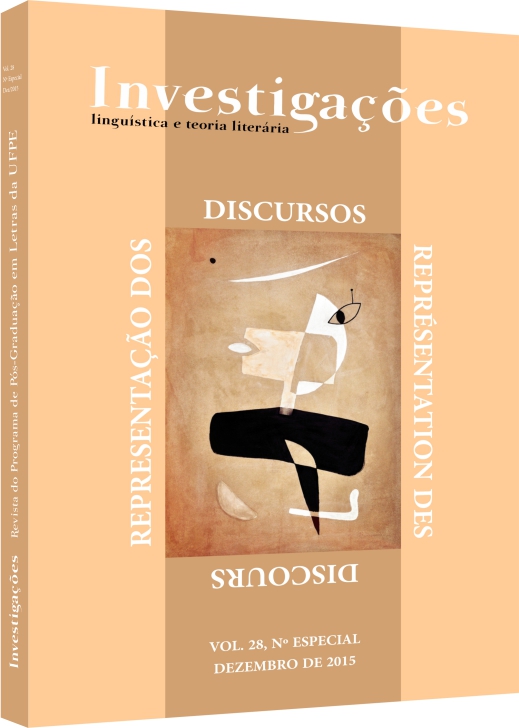“Palavra de ordem” e o discurso outro: retomadas do enunciado “Je suis Charlie”
Abstract
Neste artigo propomos o estudo de enunciados prototípicos que estariam em condições de ser particularmente afetados por um discurso outro, mais especificamente pela alusão (AUTHIER-REVUZ, 1992, 2007). Os dados utilizados são extraídos da Internet, num corpus de gêneros variados (artigos de blogs, fotos de manifestações com enunciados escritos, artigos de imprensa), em francês e em português. Apoiamo-nos, ainda, na noção de enunciado-acontecimento-tema (ZOZZOLI, Rita, no prelo), em uma visão de enunciado como afetado pela memória (COURTINE, 1981) e nas bases teóricas de Bakhtine/Bakhtin (1978/1998).
References
AMARAL, Roberto. Charlie Hebdo: não cabem limites na defesa da livre expressão In: Carta Capital. 14/01/2015, última modificação 15/06/2015. Disponível em: http://www.cartacapital.com.br/internacional/charlie-hebdo-nao-cabem-limites-na- defesa-da-liberdade-de-expressao-2759.html. Acesso em 12/11/2015.
AUTHIER-REVUZ, Jacqueline. De quelques idées reçues sur le discours rapporté. In : Perspec¬tives, n.4, p.15-21, 1992.
AUTHIER-REVUZ, Jacqueline. "Nos riscos da alusão". Tradução VAZ, A.E. M. e
CUNHA, D. A. C. In: Investigações - Linguística e Teoria Literária, v. 20, n. 2, 2007. p. 9-46.
BAKHTINE, Mikhail. Esthétique et théorie du Roman.Paris: Gallimard, 1978.
BAKHTIN, Mikhail. Questões de literatura e de estética. São Paulo : Hucitec/UNESP, 1998.
BATTAGLIA, Mattea. Nous ne sommes pas tous Charlie, nous sommes tous la Liberté. In : LE MONDE. Disponível em: http://www.lemonde.fr/education/article/2015/01/30/nous-ne-sommes-pas-tous-charlie-nous-sommes-tous-la-liberte_4567059_1473685.html. Acesso em 04/02/2015.
BROOKS, David. I Am Not Charlie Hebdo In: New York Times. Disponível em: http://www.nytimes.com/2015/01/09/opinion/david-brooks-i-am-not-charlie-hebdo.html?_r=0 . Acesso em 30/08/2015.
COURTINE J.-J. Quelques problèmes théoriques et méthodologiques en analyse du discours, à propos du discours communiste adressé aux chrétiens. In : Langages, n.62, p. 9-17, 1989.
D’ALLARD, Marion ; CHAIGNON, Alexandra ; LEMAHIEU, Thomas. La vague du « tous ensemble » plus forte que les semeurs de haine. Nous sommes charlie. In : L’Humanité. 12/01/2015. http://www.humanite.fr/la-vague-du-tous-ensemble-plus-forte-que-les-semeurs-de-haine-562229. Acesso em 12/08/2015.
MAINGUENEAU, Dominique. Genres de discours et web : existe-t-il des genres web ? In : BARATS, Christine (Org.). Manuel d’analyse du web. Paris : Armand Colin, 2013.
FRANÇOIS, Frédéric. Le discours et ses entours : essai sur l’interprétation, Paris: L’Harmattan, 1998.
PAIXÃO, Cláudia. Je suis Professor. Minha arma é o lápis. A palavra. (com desenho). In : Twitter, 30/04/2015. Acesso em 02/04/2015.
PÉTILLON, René. Dessin et énoncé: Sarko s’est glissé au premier rang avec les chefs d’état. In : Le Canard Enchaîné. 99e année, n. 4916, mercredi, 14 janvier 2015, p. 2.
REDAÇÃO. Alberto João Jardim declara-se: «Je suis Syriza» TVi24. 15/02/2015. http://www.tvi24.iol.pt/politica/madeira/alberto-joao-jardim-declara-se-je-suis-syriza. Acesso em 02/09/201.
RONCIN, Joachim, Comment j’ai crée “Je suis Charlie”. In : Libération. Deuxième édition, n. 10468, mercredi, 14 janvier 2015, p. 14.
SALDANHA, Rafael. Eu não sou Charlie, je ne suis pas Charlie. In: BLOG de Leonardo Boff. 10/01/2015. https://leonardoboff.wordpress.com/2015/01/10/eu-nao-sou-charlie-je-ne-suis-pas-charlie/. Acesso em 03 de novembro de 2015.
VÉLEZ-RODRIGUEZ, Ricardo. A resposta do mundo livre: “Je suis Charlie”. In: Instituto Liberal. 09/01/2015. http://www.institutoliberal.org.br/blog/resposta-mundo-livre-je-suis-charlie/. Acesso em 12/11/2015.
ZOZZOLI, Jean-Charles. Marca: para além da concepção de branding. In: GOMES, Neusa. (Org.) Fronteiras da Publicidade. Porto Alegre: Sulina, 2006.
ZOZZOLI, Rita. Croisements discursifs à partir d’un énoncé-événement-thème. Cahiers de Praxématique, v.62, aceito para publicação.
Downloads
Published
How to Cite
Issue
Section
License
Copyright (c) 2015 Rita Maria Diniz Zozzoli

This work is licensed under a Creative Commons Attribution 4.0 International License.
Authors who publish with Revista Investigações agree to the following terms:
Authors retain copyright and grant the journal right of first publication with the work simultaneously licensed under the Creative Commons Attribution 4.0 International (CC BY 4.0) license that allows others to share the work with an acknowledgement of the work's authorship and initial publication in this journal.
Authors are able to enter into separate, additional contractual arrangements for the non-exclusive distribution of the journal's published version of the work (e.g., post it to an institutional repository or publish it in a book), with an acknowledgement of its initial publication in this journal.
You are free to:
Share — copy and redistribute the material in any medium or format for any purpose, even commercially.
Adapt — remix, transform, and build upon the material for any purpose, even commercially.
The licensor cannot revoke these freedoms as long as you follow the license terms.
Under the following terms:
Attribution — You must give appropriate credit , provide a link to the license, and indicate if changes were made . You may do so in any reasonable manner, but not in any way that suggests the licensor endorses you or your use.
No additional restrictions — You may not apply legal terms or technological measures that legally restrict others from doing anything the license permits.

